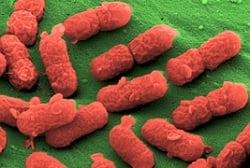 |
| E. coli Nissle 1917--Courtesy of Gunzer Lab |
To transport a hunger-suppressing molecule to the gut as a treatment for obesity, researchers at Vanderbilt University have put bacteria to work. The bacteria become lodged in the digestive system and release the lipid for up to a year at a time, altering the gut microbiome to stave off weight-related problems like diabetes and heart disease.
Presenting their study at a national meeting of the American Chemical Society, the team demonstrated that an altered strain of probiotic bacteria--E. coli Nissle 1917--could produce the molecule N-acyl-phosphatidylethanolamines, a molecule that is naturally produced in the small intestine after a meal. With a bacterial influx of that molecule, which itself converts to the appetite-suppressing lipid N-acyl-ethanolamine, the gut's environment is more conducive to weight loss.
This change in the microbiome can be sustained for 6 months to a year, lead author Sean Davies said in an ACS release, and patients are more likely to stick to a weight loss regimen when not required to remember a pill every few hours.
In animal studies, mice who drank water laced with the bacteria gained 15% less weight over 8 weeks, even when fed a high-fat diet, than mice without the bacteria. They remained leaner for up to 12 weeks after the treatment, as well.
Using bacteria as a treatment has its drawbacks, though, when introduced into a human population; bacteria are transmitted easily from person to person. To mitigate this unintended consequence, Davies and his team are looking into a further genetically modified version of the bacteria that is less likely to be transmitted.
- here's the release from the American Chemical Society